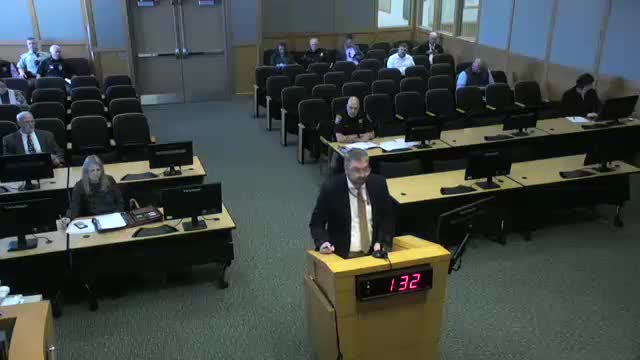Collin County tracks multiple 89th Legislature bills, flags potential unfunded mandates
Get AI-powered insights, summaries, and transcripts
Subscribe
Summary
Deputy County Administrator Russell Shofner briefed the Collin County Commissioners Court on a selection of bills from the 89th Texas Legislature, highlighting several that county staff regard as potential unfunded mandates and asking the court to keep tracking them.
Russell Shofner, Deputy County Administrator for Collin County, gave Commissioners Court an overview of selected bills from the 89th Texas Legislature that county staff are monitoring, and warned some could create unfunded obligations for the county.
Shofner told the court, "This is an unfunded mandate that would require, a county with a population of a 1000000 or more to set up a senior justice assessment center," referring to Senate Bill 160. He also flagged other measures, saying, "SB 297 ... would necessitate that the county pay for or reimburse ... confidential communication structures," and described SB 293 as increasing judicial-discipline authority while "most importantly, it would increase the judge's salary district judge's salary by $21,000 from 140 to 161." He said SB 468 would require the Texas Juvenile Justice Division to compensate counties for holding juvenile defendants longer than 30 days and described SB 664 as a comprehensive magistration bill that would alter how local administrative judges refer magistrate conduct issues to the Office of Court Administration (OCA).
Why it matters: county staff and commissioners said measures that require new county facilities, staffing or reimbursements could create budget pressure if the Legislature does not provide matching funds. The county also wants to preserve local operational models that may not fit a one-size-fits-all statutory approach.
Details from the briefing
- SB 160 (Menendez): Shofner described it as requiring a "senior justice assessment center" in counties with a population of 1,000,000 or more; the center would be county-centered and involve aging-agency and criminal-justice components. Shofner characterized it as an unfunded mandate.
- SB 293: Shofner said the bill would expand the State Commission on Judicial Conduct's authority regarding judicial discipline and "increase the judge's salary district judge's salary by $21,000 from 140 to 161," as he summarized it to the court.
- SB 297 (Perry): Shofner warned the county could be required to pay for or reimburse confidential communication structures under the proposal, which he described as another potential unfunded mandate.
- SB 468 (Sparks): Shofner said the bill would require the Texas Juvenile Justice Division to compensate counties when juvenile defendants are held in county custody longer than 30 days.
- SB 664 (Huffman): Shofner called this a comprehensive magistration bill and noted Collin County's magistrate structure is "very unique," saying the bill would make the local administrative judge the referring entity for magistrate disciplinary referrals to the OCA — a change that complicates the county's local structure.
- HB 1449 (Capriglione): Shofner said this bill would expand a prior, bracketed law (which applied to Tarrant and Dallas counties) allowing a single county permit for food trucks to operate in cities inside those counties; HB 1449 would extend that authority to all counties with a population of 1,000,000 or more.
Court reaction and next steps
An unnamed commissioner said it was "important" for the county to maintain a presence in Austin on bills that could be detrimental to county operations and that staff should testify if needed. County Judge (presiding) told the court he had asked staff to put the legislative update on the agenda each week and that staff would add any additional bills commissioners ask them to track. One commissioner said they preferred keeping the update on the general agenda so the public could see what the county is tracking.
Shofner and county staff were asked to continue monitoring the bills and to notify commissioners about developments that could affect county operations or budgets.
Ending
Commissioners did not take a formal vote to adopt a legislative position during the briefing; staff were directed to continue tracking the listed bills and to add any other bills the commissioners identify for monitoring.
